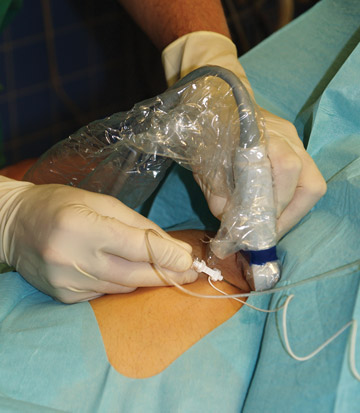The use of continuous nerve blocks to manage post-op pain provides many benefits. Patients require fewer opioids, which lowers their risk of opioid misuse and eliminates prolonged PACU stays caused by opioid-related side effects such as nausea, vomiting, urinary retention and sedation. They leave your facility sooner and feeling good, which increases their overall level of satisfaction with the care you provided and pleases surgeons who appreciate answering fewer calls from distressed patients in pain.
My anesthesia group performs 10 times as many blocks at the Texas Medical Center's trauma center than we did when I became director of regional anesthesia five years ago. Our anesthesia group also works at the ambulatory surgery center across the street, and we just began a study there to compare the cost of using blocks as a primary anesthetic in place of general anesthesia. We think the study will show what we already suspect: Regional anesthesia is significantly less expensive — and just as safe.
To manage post-op pain, our team administers single-shot blocks with the option of extending the analgesia with a catheter attached to a pain pump or a local injection of extended-release bupivacaine — a long-acting, non-opioid medication. Single-shot blocks with bupivacaine and some sort of additive such as dexamethasone or clonidine provide adequate analgesia for 24 hours after the surgery, with the pain quickly tapering off after that. After the first post-op day, patients transition to whatever medication surgeons decide is necessary — acetaminophen, ibuprofen or celecoxib, for example — and an opioid to control break-through pain as needed.
Total joint replacement patients are ideal candidates for prolonged block durations because significant post-op pain can last for many days. In fact, single-shot blocks for these cases are actually counter-productive because the patient will feel great for 24 hours, then experience "rebound analgesia," during which they go into a pain crisis. Catheter placements are appropriate for outpatient total joints, as is the use of bupivacaine.
A nerve block is an effective alternative to general anesthesia for hand surgeries. Instead of injecting a dilute formulation of bupivacaine or ropivacaine in pre-op, the anesthesia provider doubles the concentration to eliminate feeling and movement in the arm. Light sedation can be administered to improve patient comfort.
.svg?sfvrsn=be606e78_3)

.svg?sfvrsn=56b2f850_5)